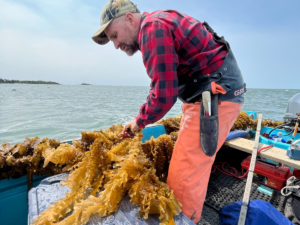By Ruth Driscoll-Lovejoy and Amy Folkerts
Ocean farmers are making a splash in the sustainable seafood market — and they don’t need state-of-the-art facilities to do it.
Thimble Island Ocean Farm in Connecticut is a commercial seaweed and shellfish farm and serves as an innovation hub for GreenWave, a nonprofit replicating and scaling regenerative aquaculture. On a recent EDF visit, our team saw first-hand how GreenWave is expanding marine aquaculture while training and supporting ocean farmers. According to GreenWave, for aquaculture to be sustainable and profitable, farmers need access to the right tools and community support.
The Right Tools are Accessible
Many of GreenWave’s tools are low-tech, repurposing shellfish and fishing industry gear for seaweed farming. GreenWave’s lab uses off-the-shelf materials and repurposes household and second-life industrial appliances. Using these readily available tools for research and development means ocean farmers can affordably replicate these models.
They are leveraging low-tech tools in the design of modular kelp seed production facilities and mobile processing infrastructure to alleviate current supply chain challenges. These accessible tools, technologies and systems to grow a competitive, domestic seaweed market.
GreenWave is tackling major issues, like climate change impacts. Warming waters delay the kelp seed production season, which leads to a shorter growing window for farmers and negatively impacts overall farm productivity. In response to these challenges, GreenWave seed production technology and cost-effective methods create a reliable seed supply, regardless of water temperature shifts. This advancement offers today’s farmers a consistent supply of seed combined with the ability to “plant.” This technology is a clear advantage for today’s farmers and in the face of climate change, may one day be a necessity.

GreenWave makes aquaculture accessible to future farmers by using readily available and repurposed tools.
A Farmer Focus in a Changing Climate
Advancing sustainable aquaculture is an imperative climate solution. Communities relying on the ocean for their livelihood and resources face warming waters, increasing acidification, and shifting and disappearing fish stocks and wildlife. Regenerative seaweed and shellfish farming could help build resilience, especially with advances in farmer-forward technology. As a nonprofit, GreenWave is building the foundation for a thriving blue economy – training farmers who are expanding their operations and connecting them to markets including food, bioplastics, agriculture, textiles, cosmetics and other industries to drive economic activity in the communities that climate change threatens most.
GreenWave’s push to build a U.S. market for ocean-farmed seaweed reminded us of EDF’s reasons for charting a responsible path forward for offshore aquaculture in the U.S. This is what makes the passage of the Science-based Equitable Aquaculture Food Act (SEAfood Act) so important.
Community Support: Moving Forward with Innovation and Policy
Right now, the U.S. lacks a comprehensive policy framework to drive offshore aquaculture forward sustainably. The SEAfood Act ensures offshore aquaculture develops in the U.S. using best practices, best available science and good community and stakeholder input. In essence, the SEAfood Act would cement policy to identify the very things GreenWave says every sustainable ocean farmer needs: the right tools and community support.
The bill is a first, responsible step toward an innovative, sustainable offshore aquaculture industry in the U.S. that will boost local economies, create jobs through the entire seafood supply chain and increase the domestic seafood supply.
Aquaculture is an exciting solution to increase seafood security and economic resilience to the climate crisis. There is ample room for human ingenuity to further advance aquaculture productivity and best practices through technological development and research. That’s why the time to pass the SEAfood Act is now; without it (and the offshore aquaculture research agenda it would implement), the potential for ocean aquaculture remains stalled.
Departing our tour with GreenWave, we felt inspired by the potential to advance sustainable aquaculture. GreenWave and its network of farmers are developing best practices and commercializing accessible technology to grow seafood and create new jobs, all in the face of climate change.
On top of all that, they are doing it with affordable technology models that others can adopt easily and quickly. With the passage of the SEAfood Act, we know others will follow the path to sustainable aquaculture, whether that’s in a lab surrounded by slow cookers or on a boat surrounded by shining waters.










